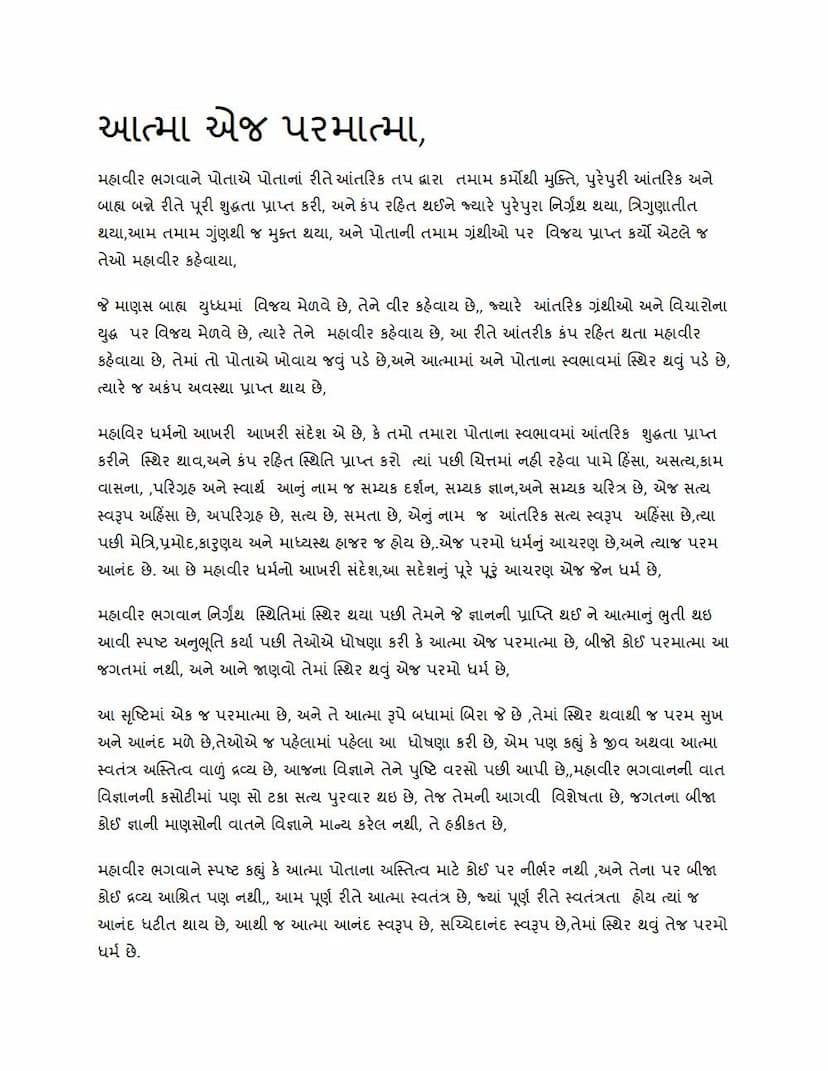Aatma Ej Parmatma
Added to library: September 1, 2025

Summary
Here's a comprehensive summary of the provided Jain text, "Aatma Ej Parmatma" (The Soul is God), in English:
Book Title: Aatma Ej Parmatma (The Soul is God) Author: Unknown Publisher: Unknown
This text, rooted in Jain philosophy, centers on the profound message that the soul (Aatma) is, in essence, God (Parmatma). It elaborates on this core tenet through the teachings and example of Lord Mahavir.
Lord Mahavir's Enlightenment and the Concept of "Mahavir":
The text begins by highlighting Lord Mahavir's achievement of complete liberation from all karmas through intense internal penance. By attaining absolute purity, both internally and externally, and becoming free from all fluctuations and attachments (a state of being "Nirgrantha" and "Trigunatit"), he conquered all inner "knots" or desires. This is why he is called "Mahavir" – the Great Victor. While someone who wins external battles is called "Veer" (hero), one who conquoys the internal battles of desires and thoughts is a "Mahavir." This state of being free from internal fluctuations is achieved by losing one's ego and stabilizing the soul in its true nature, leading to an unshaken (akamp) state.
The Ultimate Message of Mahavir:
The core message of Mahavir's teachings is for individuals to achieve inner purity, stabilize themselves in their true nature, and attain a state free from fluctuations. When this state is reached, qualities like violence, falsehood, lust, possessiveness, and selfishness cease to exist in the mind. This state is synonymous with Samyak Darshan (Right Faith), Samyak Gyan (Right Knowledge), and Samyak Charitra (Right Conduct). These are the true forms of non-violence, non-possession, truth, and equanimity. When these are achieved, virtues like friendship, joy in others' happiness, compassion, and impartiality naturally arise. This is the practice of the highest dharma (Param Dharma) and leads to ultimate bliss (Param Anand). The entire practice of Jainism is the complete adherence to this message.
The Soul as the Sole Parmatma:
After Lord Mahavir attained the state of a Nirgrantha, the knowledge that dawned upon him led to a clear realization of the soul's true nature. He then declared that "The soul is God; there is no other God in this world." Understanding this and stabilizing in it is the ultimate dharma.
The Universe and the Soul:
The text asserts that there is only one Parmatma in the universe, and this Parmatma resides in everyone as the soul. Achieving stability in this soul leads to supreme happiness and bliss. Lord Mahavir was the first to proclaim this truth. He also stated that the soul (Jiva or Aatma) is a substance with independent existence. This scientific assertion, the text claims, has been validated by modern science years later, proving the absolute truth of Mahavir's words, a distinction not shared by many other wise individuals.
The Soul's Independence and Bliss:
Lord Mahavir clearly stated that the soul does not depend on anything external for its existence, nor is anything external dependent on the soul. Therefore, the soul is completely independent. Where there is complete freedom, bliss arises. Hence, the soul is of the nature of bliss, "Sachchidanand Swaroop" (Existence-Consciousness-Bliss). Stabilizing in this state is the ultimate dharma.
Knowledge and Liberation:
The text further clarifies that only the soul possesses the knowledge of well-being and suffering. Other substances, like matter (Pudgal) and principles like dharma, adharma, space, and time, completely lack this kind of knowledge. According to the general definition of substance, the soul is transformative and eternal. In terms of substance and qualities, the soul is eternal, but in terms of its manifestations (Paryay), it is transformative. The soul's eternal qualities undergo changes, and the soul in the cycle of birth and death takes on different bodies. In this aspect, the soul is considered transformative, but it never perishes, thus remaining eternal in that regard. The soul is omniscient, omnipresent, and complete.
True Knowledge:
Knowledge is the means to liberation. This knowledge is not external knowledge. True knowledge is the one that illuminates from within, experienced after attaining a state of thoughtlessness, desirelessness, and unshakeable calm. The text explicitly states that bookish knowledge or knowledge gained from listening to others is not true knowledge. This implies that even a guru cannot directly impart this knowledge; it must be discovered from within. Those who seek it will find it, but this requires internal effort and the attainment of an unshaken state. Only then is knowledge attained, and the attainment of knowledge is liberation (Moksha). Everything else is considered futile.
The text concludes with an invitation to embark on the inner practice of becoming unshaken (akamp), penned by a philosopher.